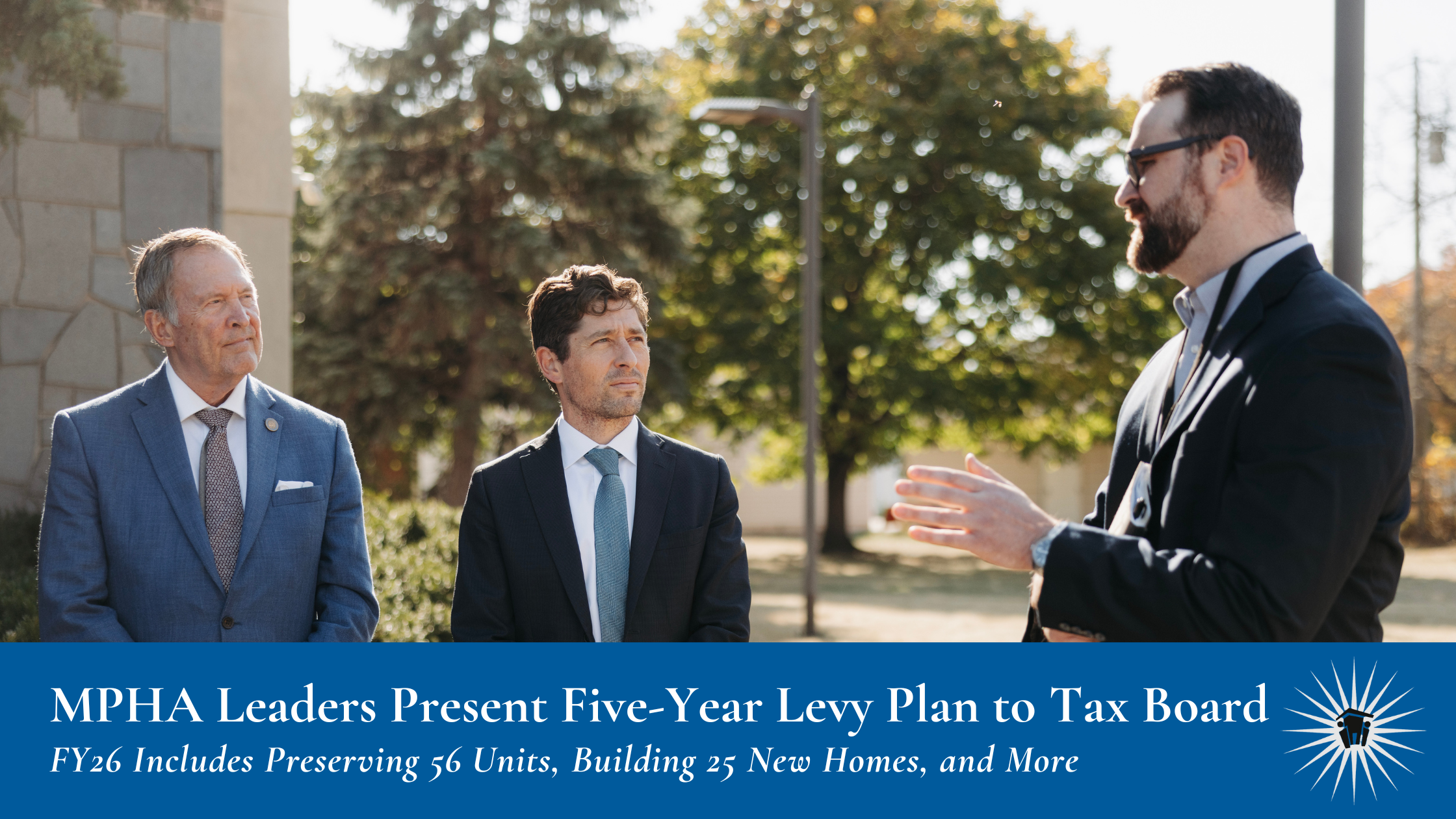Yesterday, MPHA leaders presented an update on the agency’s 2025 housing levy spending, requested maintaining the $5 million annual housing levy in 2026, and submitted a five-year levy capital plan to the Minneapolis Board of Estimate and Taxation (BET).
The agency’s 2025 levy budget focuses on two key priorities, a $3.5 million investment in the agency’s record-breaking Spring Manor redevelopment and funding a $1.5 million project replacing windows from the 1980’s at a high-rise in Northeast with new, energy efficient windows that include fall protection safety features. The agency’s proposed 2026 levy budget helps fund the renovation of 56 mid-rise units, the production of 25 new large-bedroom family units, elevator modernizations, and boiler replacement projects at numerous high-rises.
“The city’s housing levy continues to fund the preservation and production of the affordable housing Minneapolis desperately needs,” said Abdi Warsame, Executive Director/CEO of the Minneapolis Public Housing Authority. “This funding has and will continue to improve the lives of current and future MPHA residents. Our team takes great care to plan for and deploy these critical resources, and we look forward to bringing this five-year capital plan to life.”
Looking ahead to the agency’s proposed five-year (’26-’30) capital plan, highlights include:
- Building a new five-site, five-unit scattered site family housing upzoning project (25 new family units). Each new five-unit building will include four 3-bedroom and one 5-bedroom units. There is a significant unmet need for large deeply affordable family homes like this.
- Using the same U.S. Department of Housing and Urban Development (HUD) subsidy tool as the Elliot Twins and Spring Manor redevelopment, renovating two mid-rise buildings in the Howe neighborhood, rehabbing 56 units across both buildings.
- Making major capital improvements at numerous high-rises. Work will include windows, boiler systems, and elevators.
- Continuing resident engagement and pre-development activities ahead of major investments in the out years to redevelop the Glendale townhomes, centering residents’ 11 stated priorities and addressing the property’s $22 million capital backlog.
- There is an asterisk on the Glendale work. The pending historic designation would strip nearly 600 Glendale residents’ ability to freely vision a future for themselves, their families, and their community and instead hand that power to the Heritage Preservation Commission. This would threaten what is possible at the site and prevents the agency from effectively planning while the threat looms.
Historically, HUD has only provided about 10 percent of the funding necessary for major building improvements. That means each year the agency is forced to choose band-aid options to triage leaky roofs, repair and maintain brick façades, replace inefficient 60-year-old windows, or improve decades-old high-rise electrical and plumbing systems instead of more comprehensive—albeit more expensive—solutions. Over time, this problem has only compounded, creating the agency’s current capital backlog of $260 million in needs.
In recent years, agency staff have pursued and maximized just about every tool possible to address this funding gap. This includes seeking special budget permissions from HUD to develop localized solutions, creating new public-private partnerships to leverage debt financing for major renovation projects (while maintaining strong guardrails to protect residents and public ownership), accessing project-based funding supports at every level of government, and pursuing one-time and ongoing financial supports from state and local governments, like the housing levy.
In 2024, MPHA secured nearly $8 million in state and local support for its preservation and production activities, supplementing the $20 million in capital funding the agency received from HUD—a 40 percent funding boost for critical capital improvement work.
Following yesterday’s presentation, the BET will vote on MPHA’s levy request next month following the board’s annual public tax levy-setting hearing.



